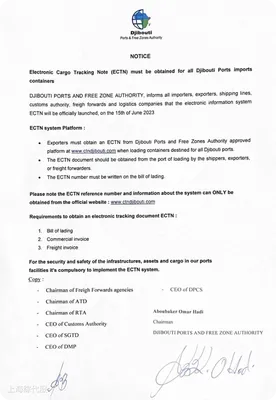The Djibouti Ports and Free Zone Authority recently announced that from June 15, 2023, all goods discharged in Djibouti ports, regardless of their final destination, will be required to hold an Electronic Freight Tracking List (ECTN) certificate.

The Electronic Freight Tracker (ECTN) is an official loading document that contains in-depth freight information, including how goods are transported between ports and how long it took, etc. From June 15 this year, the port of Djibouti will be obliged to require that all goods discharged hold this certificate.
The benefit of doing so is that all necessary information has been received by the destination port authorities before the goods arrive at the destination port, facilitating the clearance of the goods. According to data from the Djibouti CTN website, the cost of processing the ETCN certificate is $100 per standard warehouse (TEU) and $150 per large warehouse (FEU).

Located at the crossroads of one of the busiest shipping routes in the world, Djibouti Port is an important hub connecting Europe, the Far East, the Horn of Africa and the Persian Gulf. This port is an important refueling and transportation center and is also the main maritime export of neighbouring Ethiopia. About 2,500 ships pass through or stop at Djibouti Port every day.

The economy of Djibouti relies heavily on the strategic location of its ports, as about one-third of global daily shipping passes through the northeastern edge of Africa. Since the president revoked the port concession of port operator DP World in 2018, Djibouti port has been the center of legal disputes between DP World and the Djibouti government.
The Djibouti Port and Free Zone Administration (DPFZA) is the government agency responsible for managing Djibouti ports and other ports in the country, and also responsible for overseeing the National Free Zone and serving as a link between companies working in the Free Zone and other government agencies.


 Follow customer service WeChat
Follow customer service WeChat